 Petzlover
Petzlover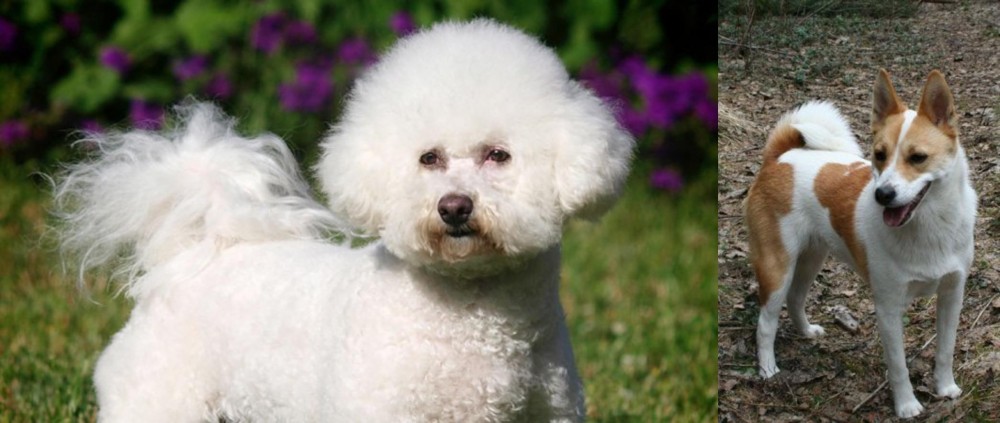 Bichon Frise is originated from Spain but Norrbottenspets is originated from Sweden. Bichon Frise may grow 16 cm / 6 inches shorter than Norrbottenspets. Both Bichon Frise and Norrbottenspets are having almost same weight. Bichon Frise may live 4 years more than Norrbottenspets. Both Bichon Frise and Norrbottenspets has almost same litter size. Both Bichon Frise and Norrbottenspets requires Low Maintenance.
Bichon Frise is originated from Spain but Norrbottenspets is originated from Sweden. Bichon Frise may grow 16 cm / 6 inches shorter than Norrbottenspets. Both Bichon Frise and Norrbottenspets are having almost same weight. Bichon Frise may live 4 years more than Norrbottenspets. Both Bichon Frise and Norrbottenspets has almost same litter size. Both Bichon Frise and Norrbottenspets requires Low Maintenance.
 Contrary to the myths and many of the tales of the history of the Bichon Frise, the breed was originally developed in Spain. Later specific trait development occurred in France to give us the lap dog Bichon Frise that we know today. The original Spanish dog – the Bichon – was a water – sailing dog. It was descended from the poodle breeds crossed with either the water spaniels or the Barbet. These early dogs were friendly and happy and because of this, sailors carried them with them on their ships and even bartered them for supplies. Prior to the 14th century the Spanish probably brought them to the Canary Islands. Later in the 14th century they we discovered again by Italian sailors who returned them to Europe where they lived in the courts of the nobility. During the Renaissance and after the French fell in love with the breed while the Spanish continue to enjoy their presence.
Contrary to the myths and many of the tales of the history of the Bichon Frise, the breed was originally developed in Spain. Later specific trait development occurred in France to give us the lap dog Bichon Frise that we know today. The original Spanish dog – the Bichon – was a water – sailing dog. It was descended from the poodle breeds crossed with either the water spaniels or the Barbet. These early dogs were friendly and happy and because of this, sailors carried them with them on their ships and even bartered them for supplies. Prior to the 14th century the Spanish probably brought them to the Canary Islands. Later in the 14th century they we discovered again by Italian sailors who returned them to Europe where they lived in the courts of the nobility. During the Renaissance and after the French fell in love with the breed while the Spanish continue to enjoy their presence.
In the late 19th century in France the breed fell out of popularity and became street dogs and circus and fair dogs. They also worked with organ grinders and assisted the blind. In the early 20th century, the Societe Centrale Canine, the National Kennel Club of France, adopted the breed’s official standard – while they were still known as both the Bichon and the Tenerife. The popularity of the breed at this time is heavily attributed to “The Adventures of TinTIn” , by Herge, which featured a small, white, fluffy fox terrier. Then the president of the Federation Cynoloqique Internationale presented a new name for the breed based on its characteristics. The name Bichon Frise kept the Bichon heritage and added “curly” the meaning of Frise. Under this name the breed was admitted to the Societe Centrale Canine stud book in October of 1934.
The Bichon Frise came to the United States for the first time in 19554 and was admitted to the American Kennel Club Stud Book in 1972. They entered the non-sporting group of the AKC in 1973. By 2001 the Bichon Frise, J.R., won the Westminster Dog Show. In 1976, the Bichon Frise came to Australia, imported by Harry and Margaret Begg who oversaw the growth of the breed there. Today there are 4 separate breeds believed to be descended from the original Bichon/Tenerife breeds – the Bichon Frise, the Bichon Bolognaise, the Maltese and the Havanese.
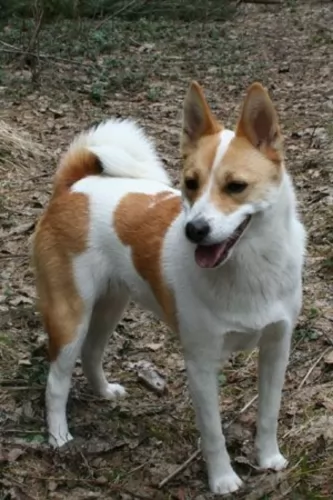 The Norrbottenspets is an ancient dog breed whose purpose has been to hunt, although these days he is a companion dog.
The Norrbottenspets is an ancient dog breed whose purpose has been to hunt, although these days he is a companion dog.
Hailing from Noorbotten, Sweden, it was after the second world war that the breed almost became extinct. This was because hunting dogs were no longer needed.
Luckily a breeding program was started, and in 1967 the Swedish Kennel Club registered the dog and a new standard was written. His friendly, amicable nature makes him a sought after companion today.
 The modern Bichon Frise is a white, small dog with a round skull and muzzle. The nose should be black and the eyes round and dark. Depending on the size of the dog, the legs and head are proportionate to the body, while the tail should be curly and long. Both the tail and the ears must not be docked. Their coat is as hypoallergenic as a dog gets. It is white, dense and for most Bichon Frise, it is curly. They should have black lips as well.
The modern Bichon Frise is a white, small dog with a round skull and muzzle. The nose should be black and the eyes round and dark. Depending on the size of the dog, the legs and head are proportionate to the body, while the tail should be curly and long. Both the tail and the ears must not be docked. Their coat is as hypoallergenic as a dog gets. It is white, dense and for most Bichon Frise, it is curly. They should have black lips as well.
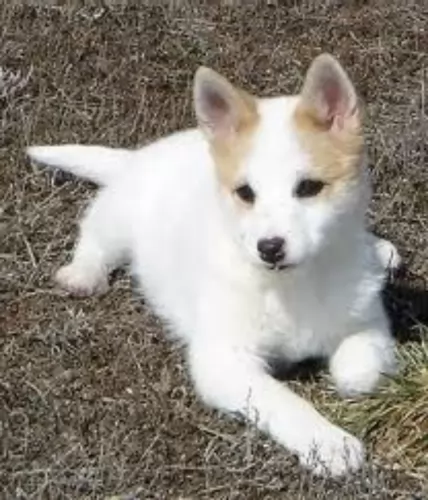 The Norrbottenspets is a small to medium sized spitz- type dog but he is muscular and compact. He stands at between 42 – 46cm in height and weighs in at between 8 and 15kg.
The Norrbottenspets is a small to medium sized spitz- type dog but he is muscular and compact. He stands at between 42 – 46cm in height and weighs in at between 8 and 15kg.
With good care he can live to be up to 15 years of age. The coat of the dog is straight and dense and you find quite a few colors such as white, yellow and reddish and sometimes there is a bit of ticking. He has a short to medium length waterproof coat which is dense.The outer coat is coarse with straight hair and the undercoat is soft and thick and the dog is a moderate shedder.
The head is wedge-shaped with erect ears, black nose and brown almond-shaped eyes. The muzzle is pointed and slim and the dog's tail is long and curls up over his back
Confident, alert and active, the Norbottenspets is an active, happy-go-lucky kind of dog, always looking for a game. It is why he gets on well with children in the home – he can sense that there is perhaps a better chance of a game with them.
He isn’t a prey-driven dog and gets on well with other pets in the home. He makes an excellent family pet and his very presence brings joy into a room as he is always cheerful.
He is stubborn and independent and will therefore require training and socialization to become obedient to your basic commands such as sit, lie-down and come.
 The Bichon Frise, according to the American Kennel Club is a cheerful and merry dog. They are gentle, playful, sensitive and affectionate. These dogs love people, are very social and like other dogs as well. They love to play with children and they are intelligent and affectionate. They were developed in their latter stages by the French to be “lap dogs” or companion animals. They are not territorial by nature but can become so if confined and encouraged. Start obedience training early and be consistent throughout their lives. They take to training easily if positive techniques are used. They do however, have a reputation for not taking well to housetraining. Be persistent
The Bichon Frise, according to the American Kennel Club is a cheerful and merry dog. They are gentle, playful, sensitive and affectionate. These dogs love people, are very social and like other dogs as well. They love to play with children and they are intelligent and affectionate. They were developed in their latter stages by the French to be “lap dogs” or companion animals. They are not territorial by nature but can become so if confined and encouraged. Start obedience training early and be consistent throughout their lives. They take to training easily if positive techniques are used. They do however, have a reputation for not taking well to housetraining. Be persistent
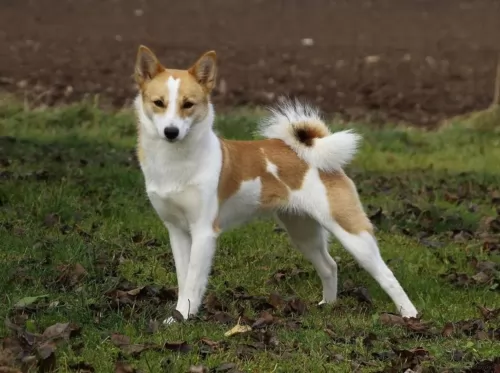 The Norrbottenspets is such an amicable, easy going pet and he is going to make you a loyal and loving canine companion. He bonds closely with his human family and will be bored and frustrated if left alone day after day in the back yard.
The Norrbottenspets is such an amicable, easy going pet and he is going to make you a loyal and loving canine companion. He bonds closely with his human family and will be bored and frustrated if left alone day after day in the back yard.
He is social and friendly and wants to be involved with the activities of his family. Feed him well, give him plenty of exercise and give him the love and care he deserves and he will make you an awesome canine companion.
 The coat of the Bichon Frise can easily become matted if not brushed or combed every day. Severe matting can lead to a hematoma in their ears. They are also very prone to ear infections so paying a lot of attention to their ears is imperative. They are will chew and scratch themselves if not groomed well and this can cause skin infections and conditions. They might have allergies to fleas, pollen, chemicals, and dust. The patella (knee cap) can be loose, diabetes, cataracts and heart disease also affect the Bichon Frise. In the United Kingdom the number one cause of death for the breed is old age -13 plus years, with 21% dying of cancer. In North America cancer is the number one killer as it is for most dogs. The Bichon might also be afflicted with hematologic disorders such as AIHA (Autoimmune hemolytic anemia) and ITP (Immune-mediated thrombocytopenia) which while less common than cancer will kill the dog much earlier in life than cancer. The other condition that the Bichon Frise is prone to are liver shunts. If found early they can be surgically corrected but most are not, and liver failure is eventually the cause of death.
The coat of the Bichon Frise can easily become matted if not brushed or combed every day. Severe matting can lead to a hematoma in their ears. They are also very prone to ear infections so paying a lot of attention to their ears is imperative. They are will chew and scratch themselves if not groomed well and this can cause skin infections and conditions. They might have allergies to fleas, pollen, chemicals, and dust. The patella (knee cap) can be loose, diabetes, cataracts and heart disease also affect the Bichon Frise. In the United Kingdom the number one cause of death for the breed is old age -13 plus years, with 21% dying of cancer. In North America cancer is the number one killer as it is for most dogs. The Bichon might also be afflicted with hematologic disorders such as AIHA (Autoimmune hemolytic anemia) and ITP (Immune-mediated thrombocytopenia) which while less common than cancer will kill the dog much earlier in life than cancer. The other condition that the Bichon Frise is prone to are liver shunts. If found early they can be surgically corrected but most are not, and liver failure is eventually the cause of death.
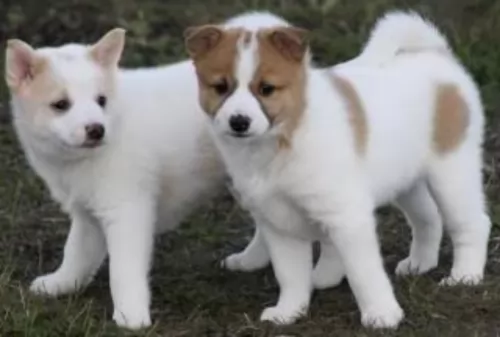 The Norrbottenspets life expectancy is between 12 and 15 years. These dogs are fairly healthy but there are always health concerns with any dog breed.
The Norrbottenspets life expectancy is between 12 and 15 years. These dogs are fairly healthy but there are always health concerns with any dog breed.
There are small numbers of the breed which are prone to a genetic condition affecting the brain and the result is poor coordination. It is sad to see because there is no known treatment and some dogs reach the stage where they can’t eat and they can’t control their toilet habits.
Dogs with hip dysplasia have an abnormal formation of the hip socket which can lead to arthritis, pain and the inability to get around. It is a genetic trait and you will need to get your pet to the vet for treatment and pain management.
 Being a small dog, the Bichon Frise is susceptible to obesity and that condition will be terminal in the end for this breed. So make sure you do not overfeed your Bichon Frise. The same is true with the use of treats. The Bichon loves treats and loves the association with treats of having pleased you. They should be fed small meals – about ¼ cup of good high quality dry food twice a day.
Being a small dog, the Bichon Frise is susceptible to obesity and that condition will be terminal in the end for this breed. So make sure you do not overfeed your Bichon Frise. The same is true with the use of treats. The Bichon loves treats and loves the association with treats of having pleased you. They should be fed small meals – about ¼ cup of good high quality dry food twice a day.
As previously mentioned the Bichon Frise is susceptible to:
Hematomas and infections of the ear if not groomed well and consistently.
Cancer is number one killer.
Hematological Issues are deadlier than cancer.
Liver shunts are a very serious concern.
Though the Bichon Frise is not an overly active dog, they do love to play. They are characterized by short bursts of activity followed by long periods of rest. They can be worn out just by running around the house. You must play with them everyday as well as take them on a walk each day. Bichons are fast and agile and do well in agility trials. They also like to compete in rally and obedience trials. Most of all they love to and need to play with their people every day.
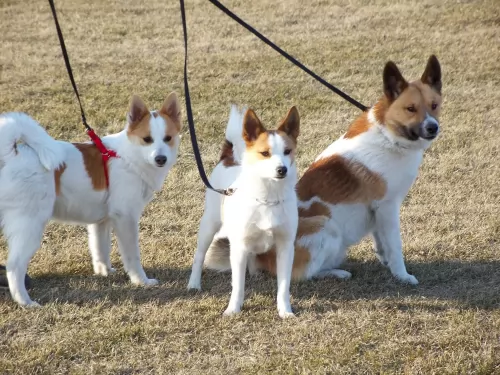 Your Norrbottenspet will be requiring a high-quality dog food if you want him to stand the best chances of being healthy. Home made food is always a good choice, but there are also some good commercially manufactured dog foods which are convenient.
Your Norrbottenspet will be requiring a high-quality dog food if you want him to stand the best chances of being healthy. Home made food is always a good choice, but there are also some good commercially manufactured dog foods which are convenient.
You want the food to have the necessary vitamins and minerals to ensure good health. Every dog will love a little bit of raw meat added to his kibble from time to time. Dogs love their meals to be consistent – no exotic, spiced foods to upset the stomach.
Boiled chicken, brown rice or pasta and cooked vegetables such as sweet potatoes, carrots and spinach can be chopped up and added to his kibble occasionally and this makes a splendid tasty treat for your pet.
You want to avoid your dog becoming overweight as this brings on a host of problems. Make sure he always has access to cool, fresh water.
The Norrbottenspets short to medium length coat will need brushing twice a week. They are clean looking dogs and you’ll find that they don’t have an unpleasant dog-smell around them.
Always check his eyes and ears for infections. Also check his teeth. A bad tooth may not be evident but it can negatively impact the immune system and cause illness with your dog.
The nails should also be cut to avoid them hooking on things.